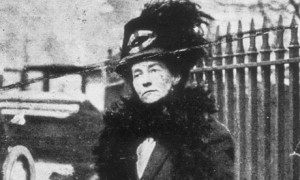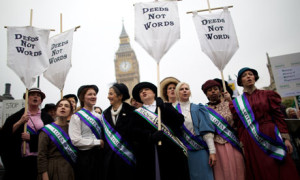Interviews by Kira Cochrane, Sarah Phillips and Jane Martinson
The Guardian (Monday 3 June 2013)
On the centenary of the death of Emily Davison, we ask prominent figures from the worlds of arts, science and politics what still needs addressing in the fight for women’s rights

Emily Davison pictured a few days before her fatal attempt to stop the King’s horse on Derby Day. Photograph: Hulton Archive/Getty Images
Camila Batmanghelidjh
Founder of Kids Company
Kidnap David Cameron and Michael Gove and take them to a crack den, to see the baby crawling among the drug paraphernalia, searching for morsels of care in her mother’s eye. I’d then let a couple of drug dealers rough them up, not because I would want to attack them personally of course, but so they could experience the chronic fear children endure daily. Then I would take them to one of our centres, where children are queuing round the block for their evening meal. After dinner we would go to a grotty bed and breakfast where some of the most vulnerable teenagers are housed alongside crazed psychiatric patients. There is no supervision at night, strangers break into rooms, assault and steal whatever they can lay their hands on. Then I would give them both a certificate entitled “Perversely outstanding, Childhood in Britain 2013”.
Mary Beard
Historian, broadcaster
We have to fight on two fronts. There are still practical and economic issues, where the work has only been half done (we still need really equal pay, proper childcare, more women in parliament, on the board or in the lab, or even, thinking worldwide, just in school). But there is also just as big a fight to change minds, preconceptions, assumptions and language. I will know that we have nearly won when we hear women being called “ambitious” as a compliment – and when men are ticked off for being “bossy” or “gossips”. For me, the struggle has to take place in our heads, as well as in the wide world.
Maggie Aderin-Pocock
Space scientist
One problem we need to tackle is the way society pigeonholes people according to their sex, creating real barriers to female aspiration. For instance, I’ve got a three-year-old daughter, and when I bought her a toy a little while ago – just a ball game – I was horrified to realise that the packaging described it as a boy’s toy. These stereotypes arise constantly, and although people sometimes say they have a biological basis, history refutes this. Seventy-five years ago it was considered really strange for a woman to become a doctor, and now around 50% of medical doctors are women. People often respond with surprise to the fact that I’m a space scientist – they’re not expecting to see a black woman in the role – and I’d like to see a time when those barriers didn’t exist, when girls believed they could do anything. I’ve long had an idea for an advert that would show two scenes in quick succession. A girl doing her physics homework being discouraged by her family, then shown 20 years later in a dead-end job. Followed by the same girl doing her homework, encouraged by her family, and shown, 20 years later, as the first person to walk on Mars.

Feminist activists dressed as suffragettes protest at Parliament Square for women’s rights and equality in London in October 2012. Photograph: Afp/AFP/Getty Images
Sarah Waters
Writer
There are plenty of feminist battles still to be fought in the UK today. Economic inequalities, power imbalances: some of the issues can be tackled through exactly the sort of collective action for legislative change that drove the suffragettes. More insidious are social attitudes and cultural norms. The pornification of popular culture, the relentless emphasis on women’s bodies, the epidemic levels of male violence against women and girls – we need campaigns about these issues, in schools and elsewhere. We need sexual exploitation to be recognised for what it is: not the work of a few out-of-control men, but something institutional, something rotten in our whole society.
Billy Bragg
Musician and activist
Giving women the vote has not led to them having parity in wages with men, and many face greater job insecurity than their male counterparts. If I were a suffragette now, I would be fighting to hold capitalism to account.
Kat Banyard
Author of The Equality Illusion and founder of UK Feminista
Suffrage campaigners knew winning the vote was just the beginning. And they knew unpicking patriarchy wouldn’t exactly be easy. Suffragettes found themselves confronted by women’s anti-suffrage societies warning that the ballot box would spell disaster. Today, cosmetic surgeons fuel the idea that women’s body hatred can literally be cut out of them, while Hugh Hefner & co tell us the path to sexual liberation leads up to the door of the Playboy mansion. It’s as true as it was 100 years ago: as feminists we need to be brave – and we need to see through bullshit.
Sir Patrick Stewart
Actor
The backbone of a modern suffragette agenda must be this question: why, in 2013, do two women die every week as a result of domestic violence? This statistic is utterly incomprehensible to me. When I was a small child, I grew up witnessing domestic violence. It angers me that so little has changed since then – that countless women continue to live in fear, as my mother did. My priority would be to ensure that abused women and children are given the support and protection they deserve. That’s something I am campaigning for right now, as patron of the national domestic violence charity Refuge. We’re asking people to sign our petition at www.refuge.org.uk/maria (In Maria’s Name), urging the government to open a public inquiry into the police and state response to victims of domestic violence. We must find out why so many women are being failed by those agencies that have a duty to protect human life.
The suffragettes fought for the vote; it’s our job to fight for equality in all spheres of life. Women need access to decent, affordable housing; childcare responsibilities need to be shared more equally between men and women; equal pay legislation must be enforced. Domestic violence is a product of wider gender inequality. We must balance the scales to keep women and children safe.
Salma Yaqoob,
Former leader of the Respect party
It was not co-incidental that the target of Emily Davison’s protest one hundred years ago was the Epsom Derby: a symbol of privilege and tradition. It is important that feminists today do not lose sight of the importance of class and race, as the same power hierarchies which entrench economic inequality and racial division also act to privilege men over women.
Real gains have been made through the determination and heroism of thousands of suffragettes. However, in recent decades, neoliberalism has turned the clock back on women’s equality. In Britain, austerity is hitting poor women hard, and poor BME women harder still. Feminists have an important role in reframing the political debate about austerity and by doing so can build a movement that brings meaningful advancement for women as a whole. This solidarity should also extend to BME feminists, including Muslim women who are not always embraced by the sisterhood at home and abroad. Yet we can see modern-day equivalents of Emily Davison in the women of the Arab spring, who bravely stood up to brutal dictators to demand democracy, and who are still challenging patriarchal oppression in the aftermath. The suffragette slogans of a century ago, “Dare to be Free” and “Deeds not Words”, are still relevant.
Helen Pankhurst
Great-granddaughter of Emmeline and ambassador for Care International
As a modern-day suffragette, I feel that the issue of voice and representation in all spheres – but particularly in the political one – remains top of the list. Votes for Women was only ever the start. Equal representation is the next milestone, and the suffragettes should – and I hope will – continue to haunt both the general British public and politicians until this is achieved. Also of fundamental importance is the need to address the global horror of violence against women and girls. In many countries, it feels like the tide on this is changing, that there is a groundswell in which individual actions, mass campaigns and the law are increasingly making it clear that society will no longer tolerate abuse – that perpetrators of violence will be prosecuted, whoever they are, wherever and whenever the crimes take place, and that the days of subjecting anyone to abuse are coming to an end.
The suffragettes knew a lot about domestic and state violence, and had the courage to stand firm in the face of derision and brutality. For thousands of women, belonging to the suffragette cause gave colour and meaning to their lives, and their unflinching activism played a part in the much wider transformation of our society – it moved us away from the rigid divisions of class, gender and race to the more inclusive and enabling context we live in today.
Jackie Kay
Poet and novelist
If the great suffragettes were to come back from the dead, I would hope they would tie themselves to the railings for the refugees. Women make up nearly 50% of all international migrants, fleeing conflict, poverty, disasters and forced marriages. And women on the move are particularly vulnerable to harm.
Yasmeen Hassan
Global director of Equality Now
Sexual violence, female genital mutilation, sex trafficking and the impact of laws that discriminate on the basis of sex are the issues that I believe suffragettes would be working on today. Feminism is now less of a fight and more about fixing the imbalances in the world, so that all of us benefit. A more gender-equal world would result in solving many of the current problems, including poverty, conflict and terrorism. To get there, a good starting point is challenging the sex stereotypes that we encounter in our daily lives.
Jennifer Siebel Newsom
Filmmaker, missrepresentation.org
I’m most passionate about challenging the misrepresentations of gender in the media, because media has an increasingly harmful and real impact on how we all learn to see and treat women and girls.
Humaira Bachal
Campaigner and subject of Chime for Change film Humaira: The Dream Catcher
If I were a suffragette today, I would fight to create change at the grassroots level. My hometown, Muwach Goth, has motivated me to take a stand, and I would like other girls in my community to have the same opportunity. I believe that education is key to finding one’s voice, and that it stands to transform Pakistan from the ground up.
Michele Hanson
Columnist and author
About 25 years ago, I found out that a woman I knew was being bashed about by her husband. I’d heard of “black and blue” before. Now I saw it properly. She showed me her bruises in a public lavatory. Would she have done any better now? Probably not. At least there were refuges able to take her. She wouldn’t go, but they were there. So perhaps the best place to start is at the bottom, where women are struggling to get off the ground, never mind getting through a glass ceiling. Because things seem to be getting worse.

